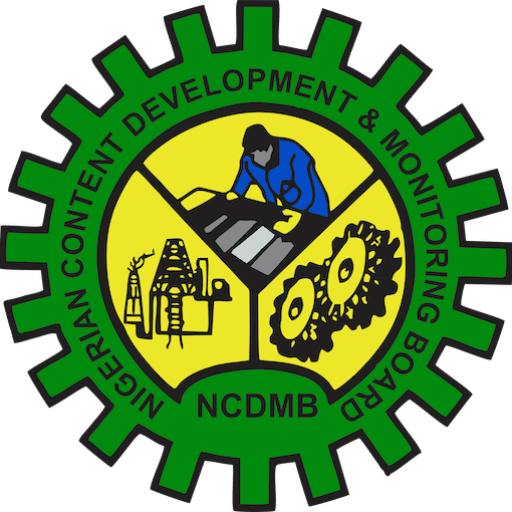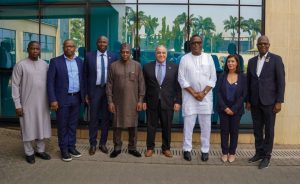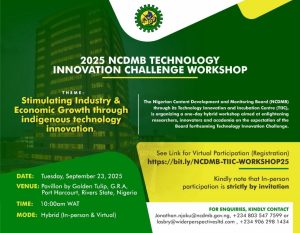A former Vice Chancellor of the University of Port Harcourt, Professor Joseph Atubokiki Ajenka, has canvassed the engagement of universities across the country as local content vehicles to advance the goals of in-country value addition and economic development through research, innovation and technological endeavours.
Speaking as Guest Lecturer at the 5th edition of the Nigerian Content Academy Lecture Series, the don said every state in Nigeria is richly endowed with natural resources and that the universities are well-positioned to deploy research and development (R&D) capabilities to transform such resources into economic wealth rather than have them exported.
For the oil and gas industry in particular, he noted that raw materials have been extensively researched by academic institutions and that the University of Port Harcourt has since been designated as “a Centre of Excellence in Oil Field Chemical Research,” with significant research outcomes that could be harvested by the Nigerian Content Development and Monitoring Board (NCDMB).
Professor Ajenka, who spoke on the topic “Innovation and Technological Development as Levers for Local Content Development,” commended the NCDMB for signalling its readiness to partner universities and industry in the implementation of its local content mandate through its material support to Triple Helix Nigeria and active involvement in its activities.
The Triple Helix, a trilateral network of academia (universities), industry (business) and government, is anchored on collaborative interaction to drive innovation and knowledge-sharing for economic growth and societal development. NCDMB’s Director of Corporate Services, Dr. Abdulmalik Halilu, is the current President of Triple Helix Nigeria.
Professor Ajenka, a Fellow of the Nigerian Academy of Engineering, emphasised that the “the problems of the world are complex” and that “we cannot live and work in silos and achieve better results and sustainability.” Collaboration and partnership (Sustainable Development Goal 17), he noted, means multidisciplinary research teams working with industry experts.
According to him, “Every year university research yields discoveries with commercial potential,” which require the involvement of technology transfer professionals to manage the complex process of shepherding ideas or research outcomes through laboratories to the marketplace. Their roles entail evaluating and protecting discoveries and ultimately, commercialisation of inventions through new and existing companies. He urged the NCDMB to support higher institutions in training technology transfer managers, noting that they are unavailable in Nigeria.
Elaborating on how research has been beneficial in creating and adding value in local economies, he said South Africa’s 26 public universities generated R500 billion (US$26 billion) in 2018 alone. In the United Kingdom, the University College, London, earned US$477 million from the acquisition of its Orchard Therapeutics by Kyowa Kirin.
Professor Ajenka pointed out that for research to make impact, it must be innovative, globally recognised and locally relevant. Such research must address challenges – global and local – and be competitive in attracting grants, while also being strategically sustainable, providing solutions to present-day needs without compromising the ability of future generations to meet theirs.
He dwelt at length on the nexus between research, innovation and money, citing the words of a renowned American author, Jeff Nicholson: “Research is the translation of money into knowledge…. And innovation is the transformation of knowledge into money.” According to him, “once we discover new knowledge, innovation comes in to transform that knowledge into goods and services to make more money.”
The former Vice Chancellor said mentorship is required to encourage innovation and creativity, and that industry experts need to continue mentoring upcoming scientists, engineers and professionals in terms of innovation rather than retire to their villages after active working life. He also called for change of mindset among academics, urging them “to move away from “publish-or-perish” mentality to a “patent-publish-produce” paradigm, which means the products of their research endeavours actually get to the marketplace.
In his summary and comments on the presentation, Dr. Ama Ikuru, Director of the Nigerian Content Academy, expressed satisfaction with the depth of the work, and said the suggestions made were well-noted. He also highlighted strategic interventions the NCDMB has made in tertiary institutions and in partnership with operating and serving companies and others to advance research, innovation and technological development as means of deepening local content.
He said the Board has done much in institutional strengthening for research and innovation, having established six centres of excellence, each with a specialised focus. These are Niger Delta University, Amassoma; Federal University of Technology, Akure; Federal University of Technology, Owerri; Federal University of Technology, Minna; Modibbo Adama University, Yola; and Usman Dan Fodio University, Sokoto. At the University of Port Harcourt, NCDMB contributed significantly to the equipment of the Sub-sea School, and also endowed a professorial chair. In the coming months, the construction of an engineering innovation centre would begin at the institution, jointly sponsored by NCDMB and the Nigerian Liquefied Natural Gas (NLNG) Limited.
In addition to investments in research and innovation facilities in tertiary institutions and Information and Communication Technology (ICT) in secondary schools across the country, the Board has a US$50 million Research and Development Fund which researchers could easily access, while a Technology Incubation and Innovation Centre, owned, fully equipped, and operational, is housed within the Nigerian Content Tower (NCT), its corporate headquarters in Yenagoa.
A participant, Professor K.K. Nwozor, remarked that the NCDMB has been impressive in the way it conducts its regulatory role, but needed to do more to bridge gap between the Board and academia. He would want the Board to do more, be “a clearing house,” to make the academia know what the oil and gas industry needs and facilitate their own contribution through research.
The Nigerian Content Academy Lecture Series are designed to close knowledge gaps and empower individuals and organisations with the knowledge, skills, and networks necessary to drive sustainable local content growth and value creation. The next Lecture, on the topic “How Can We Grow Nigerian Foreign Direct Investments through the Implementation of Local Content” will be delivered by the Special Adviser to the President on Energy, Mrs. Olu Verheijen.
Discover more from Nigerian Content Development & Monitoring Board
Subscribe to get the latest posts sent to your email.











